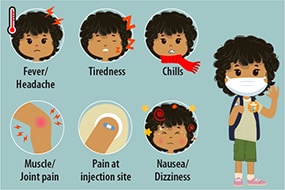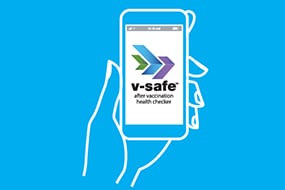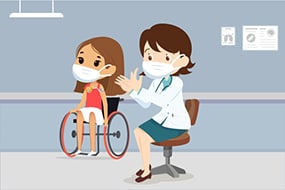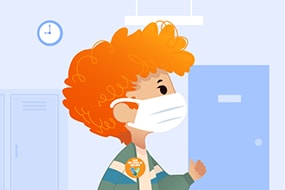COVID-19 Vaccines for Children and Teens
August 3, 2022
https://www.cdc.gov/coronavirus/2019-ncov/vaccines/recommendations/children-teens.html
or the best protection, CDC recommends COVID-19 vaccines for everyone 6 months and older and boosters for everyone 5 years and older, if eligible.
6 Things to Know about COVID-19 Vaccination for Children
1. COVID-19 vaccination for children is safe.
Before recommending COVID-19 vaccination for children, scientists conducted clinical trials. Then, the U.S. Food and Drug Administration (FDA) determined COVID-19 vaccines are safe and effective for everyone 6 months and older.
Ongoing safety monitoring shows that COVID-19 vaccination continues to be safe for children. The known risks of COVID-19 and possible severe complications outweigh the potential risks of having a rare, adverse reaction to vaccination.
Learn more about the safety of COVID-19 vaccination for children.

Tips for Parents and Caregivers:
- Before vaccination, tell the vaccine provider about any allergies your child may have—just like what you would do when your child receives their routine vaccines.
- Requesting accommodations at COVID-19 vaccination sites: When making an appointment or arriving for vaccination, you can let staff and/or volunteers know your child might need some accommodations. By law, children are also allowed to have a service animal accompany them. Learn more about COVID-19 Vaccination for Children and Teens with Disabilities.
2. Getting vaccinated can help protect children against COVID-19.
Vaccinating children can:
- Prevent children from getting seriously sick if they do get COVID-19. COVID-19 vaccination continues to protect children against severe disease, including hospitalization. There is no way to tell in advance how children will be affected by COVID-19. Children with underlying medical conditions are more likely to get severely ill from COVID-19. However, healthy children without underlying medical conditions can also experience severe illness.
- Give parents greater confidence for children to participate in childcare and school and in sports, playdates, extracurricular activities, and other group activities.

Tips for Parents and Caregivers:
- Learn more about protecting your family against COVID-19.
- Questions You Can Ask Your School to Learn More About Their COVID-19 Precautions
3. Children may have some side effects after COVID-19 vaccination.
Reported side effects are mild, temporary and like those experienced after routine vaccines. Some children have no side effects.
Learn more about potential side effects in children after COVID-19 vaccination.


After getting your child vaccinated, use v-safe to get health check-ins and share how your child feels after COVID-19 vaccination.
4. Children receive a smaller dose of COVID-19 vaccine than teens and adults.
COVID-19 vaccine dosage is based on age on the day of vaccination, not on a child’s size or weight. This is also true for other routinely recommended vaccines, like hepatitis A and hepatitis B vaccines.

Tips for Parents and Caregivers:
- Learn more about COVID-19 vaccine dosage for children and COVID-19 boosters for children and teens.
5. Children who have already had COVID-19 should still get vaccinated.
Emerging evidence indicates that people can get added protection by getting vaccinated after they have been infected with the virus that causes COVID-19. For children who have been infected, their next dose can be delayed 3 months from when symptoms started or, if they did not have symptoms, when they received a positive test.
If your child tests positive for COVID-19 after getting their first shot, they should wait until their isolation period has ended before getting their second shot.

6. Children can safely receive other vaccines the same day they receive their COVID-19 vaccine.
Routine vaccination is an important preventive care service that should not be delayed.
If multiple vaccines are given at a single visit, each injection will be given in a different injection site, according to recommendations by age.

COVID-19 vaccines are accessible and can be found in a variety of locations
- The federal government is providing COVID-19 vaccines free of charge to everyone living in the United States, regardless of their immigration or health insurance status.
- Check with your child’s healthcare provider about whether they offer COVID-19 vaccination.
- Contact your state, territorial, local, or tribal health department for more information.
- Check your local pharmacy’s website to see if vaccination walk-ins or appointments are available for children.
- Search vaccines.gov, text your ZIP code to 438829, or call 1-800-232-0233 to find locations near you that may be offering vaccines for children.